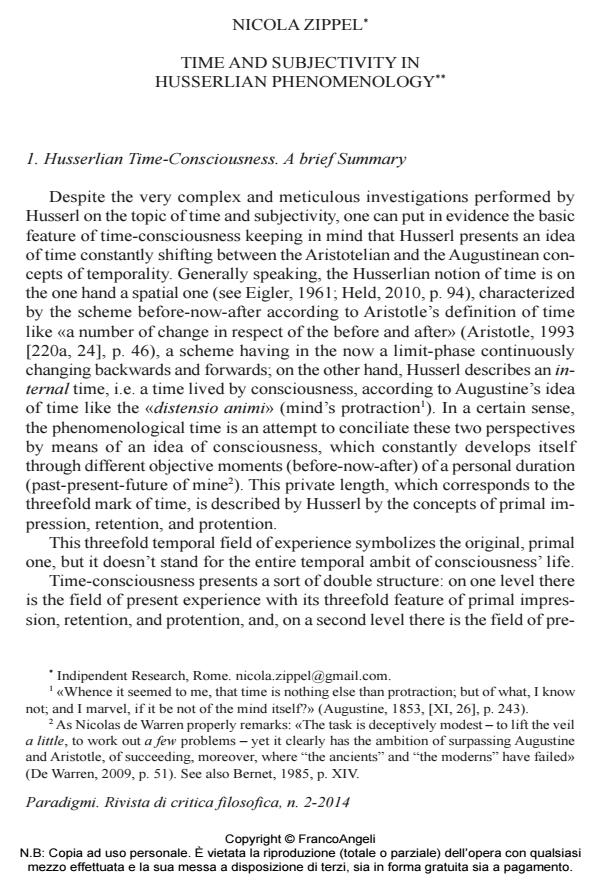Time and Subjectivity in Husserlian Phenomenology
Journal title PARADIGMI
Author/s Nicola Zippel
Publishing Year 2014 Issue 2014/2
Language Italian Pages 17 P. 117-133 File size 202 KB
DOI 10.3280/PARA2014-002007
DOI is like a bar code for intellectual property: to have more infomation
click here
Below, you can see the article first page
If you want to buy this article in PDF format, you can do it, following the instructions to buy download credits

FrancoAngeli is member of Publishers International Linking Association, Inc (PILA), a not-for-profit association which run the CrossRef service enabling links to and from online scholarly content.
The paper aims at showing the basic features of the complex relationship between temporality and subjectivity in Husserl’s phenomenology. After a very brief description of the basic threefold features of time-consciousness described in the Time-Lectures, we will focus our attention on the issue of absolute subjectivity sketched in some passages of the text. This will allow investigating more extensively the main reflections carried out by Husserl in his researches of Bernau and in the later inquiries in the 1930s. In doing it, we will analyze the topic of the peculiar temporality of the ego and its relation with the consciousness as a flow paying particular attention to the role played by the notion of matter (hyle). As an outcome, we will show that the relationship between time and subjectivity is neither unilateral nor uniform, but rather it assumes many shapes of reference occurring at diverse levels of constitution. By means of a final general schema we will try to outline the basic forms of such multifaceted relationship.
Keywords: Phenomenology, time-consciousness, subjectivity, matter, temporalization, constitution
- Plato (1894). The Parmenides of Plato. After the paging of the Clarke manuscript. With introductions, facsimiles, and notes by W.W. Waddell. Glasgow: Maclehose and Sons.
- Ricoeur P. (1950). Introduction. In: E. Husserl. Idées directrices pour une phénoménologie. Paris: Gallimard (Engl. transl.: A Key to Husserl’s Ideas I. Milwaukee: Marquette University Press, 1996).
- Rodemeyer L. (2010). A Return to Retention and Recollection: An Analysis of the Possible Mutual Influence of Consciousness and Content. In: Lohmar D, Yamaguchi I., eds. On Time – New Contributions to the Husserlian Phenomenology of Time. Dordrecht: Springer: 231-249. DOI: 10.1007/978-90-481-8766-9_1
- Sakakibara T. (2010). Reflection Upon the Living Present and the Primal Consciousness in Husserl’s Phenomenology. In: Lohmar D, Yamaguchi I., eds. On Time – New Contributions to the Husserlian Phenomenology of Time. Dordrecht: Springer: pp. 251-271. DOI: 10.1107/978-90-481-8766-9_1
- Aristotle (1993). Physics Book IV. Engl. transl. by E. Hussey. Oxford: Oxford University Press.
- Augustine (1853). Confessions of S. Augustine. Engl. transl. by. E.P. Pusey. Oxford: John Henry Parker.
- Bernet R. (1985). Einleitung. In: E. Husserl, Texte zur Phänomenologie des inneren Zeitbewussteins (1893-1917). Hamburg: Meiner.
- Bernet R. (2001). Einleitung der Herausgeber. In: E. Husserl, Die Bernauer Manuskripte über das Zeitbewusstsein (1917/18). Husserliana XXXIII. Hrsg. Von R. Bernet und D. Lohmar. Dordrecht: Kluwer Academic Publishers.
- Brough J.B. (2010). Notes on the Absolute Time-Constituting Flow of Consciousness. In: Lohmar D, Yamaguchi I., eds. On Time – New Contributions to the Husserlian Phenomenology of Time. Dordrecht: Springer: pp. 21-49. DOI: 10.1007/978-90-481-8766-9_
- De Warren N. (2009). Husserl and the Promise of Time. Cambridge: Cambridge University Press. DOI: 10.1017/CBO978051165741
- Eigler G. (1961). Metaphysische Voraussetzungen in Husserls Zeitanalyse. Meisenheim/Glan: Verlag Anton Hain.
- Fink E. (1966a). Vergegenwärtigung und Bild. In: Id. Studien zur Phänomenologie 1930-1939. The Hague: M. Nijhoff: 1-78.
- Fink E. (1966b). Die phänomenologische Philosophie Edmund Husserls in der gegenwärtigen Kritik, In: Id. Studien zur Phänomenologie 1930-1939. The Hague: M. Nijhoff: pp. 79-156. DOI: 10.1007/978-94-011-6422-1_
- Held K. (2010). Phenomenology of “Authentic Time” in Husserl and Heidegger. In: Lohmar D, Yamaguchi I., eds. On Time – New Contributions to the Husserlian Phenomenology of Time. Dordrecht: Springer: 91-115. DOI: 10.1007/978-90-481-8766-9_
- Husserl E. (1954). Die Krisis der europäischen Wissenschaften und die transzendentale Phänomenologie. Eine Einleitung in die phänomenologische Philosophie. Husserliana VI. Hrsg. von W. Biemel. The Hague: M. Nijhoff. (Engl. transl.: The Crisis of European Sciences and Transcendental Phenomenology, Evanston: Northwestern University Press, Evanston).
- Husserl E. (1966). Zur Phänomenologie des inneren Zeitbewußtseins (1893-1917). Husserliana X. Hrsg. von R. Boehm. The Hague: M. Nijhoff (Engl. transl.: On the Phenomenology of the Consciousness of Internal Time. Dordrecht: Kluwer Academic Publishers, 1991). DOI: 10.1007/978-94-011-3718-
- Husserl E. (1976). Ideen zu einer reinen Phänomenologie und phänomenologischen Philosophie. I. Buch. Husserliana III/1. Text der 1.-3. Auflage. Neu Hrsg. von K. Schumann. The Hague: M. Nijhoff. (Engl. transl.: Ideas Pertaining to a Pure Phenomenology and to a Phenomenological Philosophy. First Book: General Introduction to a Pure Phenomenology. Dordrecht: Kluwer Academic
- Publishers, 1982). Husserl E. (2001). Die Bernauer Manuskripte über das Zeitbewusstsein (1917/18). Husserliana XXXIII. Hrsg. von R. Bernet und D. Lohmar. Dordrecht: Kluwer Academic Publishers.
- Husserl E. (2006). Späte Texte über Zeitkonstitution (1929-1934). Die C-Manuskripte. Hrsg. von D. Lohmar. Husserliana Materialen VIII. Dordrecht: Springer.
Nicola Zippel, Time and subjectivity in husserlian phenomenology in "PARADIGMI" 2/2014, pp 117-133, DOI: 10.3280/PARA2014-002007